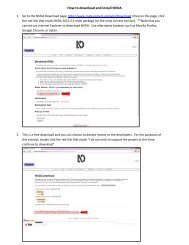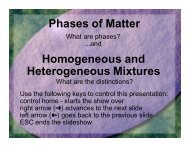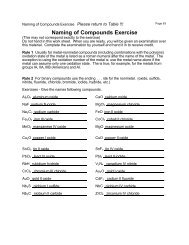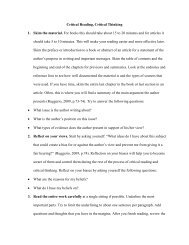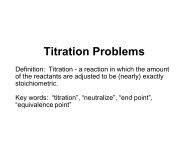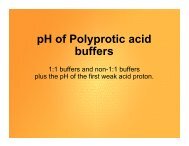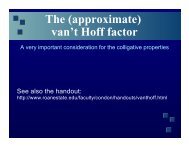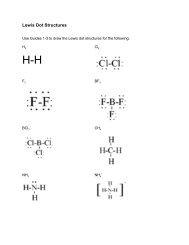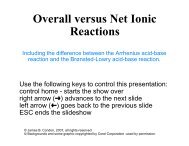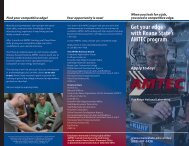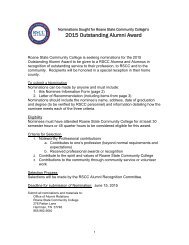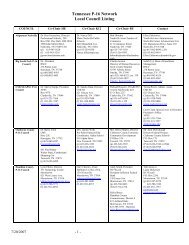2006-2008 Catalog - Roane State Community College
2006-2008 Catalog - Roane State Community College
2006-2008 Catalog - Roane State Community College
You also want an ePaper? Increase the reach of your titles
YUMPU automatically turns print PDFs into web optimized ePapers that Google loves.
7111-<strong>Roane</strong>StCommColl 6/16/06 2:58 PM Page 214<br />
Course Descriptions<br />
214 ROANE STATE COMMUNITY COLLEGE<br />
EMT 212—Paramedic II. . . . . . . . . . . . . . . . . . . . . . . . . . . . . . . . . . . . . . . 13 Credits<br />
Paramedic II is the second of a 3-part series to prepare the student for the National Registry<br />
Paramedic examinations. Upon successful completion of these examinations the student will<br />
be eligible for <strong>State</strong> of Tennessee EMT-Paramedic licensure. Topics include pulmonology, neurology,<br />
endocrinology, gastroenterology, hematology, urology and nephrology, gynecology, obstetrics,<br />
neonatology, pediatrics, and trauma. (Prerequisite: EMT 211; Corequisite: EMT 222)<br />
Sp<br />
13 hours lab/lecture per week<br />
*EMT 217—Comprehensive Advanced Cardiac Life Support. . . . . . . . . 3 Credits<br />
An introduction to common cardiac emergencies encountered by pre-hospital care providers in<br />
adult and child populations. Emphasis is on the recognition and management of emergencies<br />
related to the respiratory and cardiovascular systems. This course covers interpretation of EKG<br />
rhythm strips and treatment algorhythms. Introduction to ischemias, injury and infarction patterns<br />
in 12-lead EKGs. Upon successful completion of this course, students will be ACLS and<br />
PALS trained by AHA standards. This course is available to EMTs, EMT-Ps, nurses, respiratory<br />
therapists, and physicians.<br />
3 hours lecture<br />
EMT 218—Paramedic III . . . . . . . . . . . . . . . . . . . . . . . . . . . . . . . . . . . . . . . 6 Credits<br />
Paramedic III is the third of a 3-part series to prepare the student for the National Registry<br />
Paramedic examinations. Upon successful completion of these examinations the student will<br />
be eligible for <strong>State</strong> of Tennessee EMT-Paramedic licensure. Topics include clinical decisionmaking,<br />
allergies and anaphylaxis, toxicology and substance abuse, environmental emergencies,<br />
psychiatric and behavioral disorders, and domestic violence. (Prerequisite: EMT 212;<br />
Corequisite: EMT 223) Su<br />
12 hours lecture/lab per week<br />
EMT 221—Clinic I . . . . . . . . . . . . . . . . . . . . . . . . . . . . . . . . . . . . . . . . . . . . 3 Credits<br />
Clinical experience in area hospitals and ambulance services. (Corequisite: EMT 211) F<br />
135 Clinical Hours<br />
EMT 222—Clinic II. . . . . . . . . . . . . . . . . . . . . . . . . . . . . . . . . . . . . . . . . . . . 3 Credits<br />
Clinical experience in area hospitals, ambulance services, and geriatric and psychiatric facilities.<br />
Continuation of EMT 211. (Corequisite: EMT 212) Sp<br />
135 Clinical Hours<br />
EMT 223—Clinic III . . . . . . . . . . . . . . . . . . . . . . . . . . . . . . . . . . . . . . . . . . . 4 Credits<br />
Clinical experience in area hospitals and ambulance services. Emphasis will be upon making<br />
patient care decisions and directing patient care in the pre-hospital setting, within the scope of<br />
training. (Corequisite: EMT 218) Su<br />
215 Hours<br />
*EMT 225—Critical Care. . . . . . . . . . . . . . . . . . . . . . . . . . . . . . . . . . . . . . . 7 Credits<br />
Critical Care Emergency Medical Transport Personnel, CCEMTP. This intensive course is offered<br />
in conjunction with the University of Maryland Baltimore Campus (UMBC). It provides<br />
the foundation which prepares the paramedic or nurse as a critical care transport specialist. The<br />
80+ hour course covers a wide variety of critical care topics including: critical care environment,<br />
breathing management, surgical airway management, hemodynamic management, cardiac<br />
management, pharmacological management, GI, GU, and renal management,<br />
neurological management, transport considerations and special considerations. Upon successful<br />
completion, students will receive a certificate from UMBC valid for three years.<br />
Prerequisites include: ACLS, PALS or ENPC (trauma course) BTLS/PHTLS/TNCC, CPR and<br />
two years working in your field of medicine. F<br />
3 hours lecture—3 hours laboratory<br />
*This course does not meet any curricular requirements for any program, with the exception of<br />
technical requirement for the A.A.S. General Technology program.



